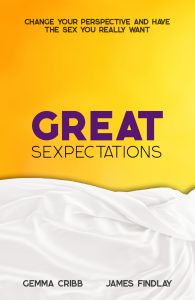
 Recent surveys in the UK report that approximately one in three women deem themselves less interested in sex than they should be and one in four men believe they don’t last long enough in bed. In a nutshell, our sexpectations (beliefs that we hold consciously or unconsciously about sex, passed down through our upbringing, peer group and personal sexual history) are making us more insecure, causing our mental health, self-esteem and relationships to suffer. Enter Great Sexpectations… this revolutionary book will guide you through simple exercises to help you discover your authentic sexual self and rectify unhelpful beliefs and behaviours so you can enjoy truly fulfilling relationships and sexual experiences. From Australia, its authors – heterosexual, sex therapist and clinical psychologist Gemma Cribbs and award-winning gay sex journalist James Findlay – answer Sam Bennett’s questions.
Recent surveys in the UK report that approximately one in three women deem themselves less interested in sex than they should be and one in four men believe they don’t last long enough in bed. In a nutshell, our sexpectations (beliefs that we hold consciously or unconsciously about sex, passed down through our upbringing, peer group and personal sexual history) are making us more insecure, causing our mental health, self-esteem and relationships to suffer. Enter Great Sexpectations… this revolutionary book will guide you through simple exercises to help you discover your authentic sexual self and rectify unhelpful beliefs and behaviours so you can enjoy truly fulfilling relationships and sexual experiences. From Australia, its authors – heterosexual, sex therapist and clinical psychologist Gemma Cribbs and award-winning gay sex journalist James Findlay – answer Sam Bennett’s questions.
How is life in Australia right now?
G: The beginning of the year was challenging in organising life and work around the Covid restrictions. At the moment things are returning to normal where I am and it’s a big relief to get back to ‘business as usual’.
J: I moved to regional Victoria (nearly two hours north of Melbourne) at the beginning of May. We’ve only had two active cases of coronavirus in the past two months and have one current active case, so things are quite good here. I do feel for my friends and family in Melbourne though, where they have gone into a strict lockdown again to try and get infections under control. The rest of Australia is slowly coming out of lockdowns of different degrees, but compared to other parts of the world – like the UK – we’re doing quite well.
Have you both noticed the effect lockdown has had on people’s sex lives?
G: Covid’s effect on people’s sex lives has been variable. Some single people have struggled to date given the lockdown restrictions and therefore have been challenged to either go without sex, or adapt and incorporate new understandings of what sex might entail. Solo sex and sex via online mediums have been interesting explorations for those willing to try it. Other people in existing relationships seem to have more or less sex depending on how much stress Covid has put on them and their relationships.
J: When we were first in lockdown, things went very quiet. Very few people were on Grindr and Scruff, and my local sex store sold out of fleshlights! Another sex store put purchasing limits on lube! (Albeit 5L, but still…) It was a particularly difficult time for single people, as hook ups give us the opportunity to touch other people. When we’re told not to hug or touch other people, to stay 1.5m away from people, to not have people in our apartments – it’s very challenging. Now Melbourne is back in lockdown, I imagine many people will be anxious about going through that again. Maybe people will be more prepared with ‘lockdown lovers’. We’ll have to wait and see.

Gemma – In Great Sexpectations, you make it clear from the onset that its authors are not the voices of experience for every type of person. As excellent as your book is, is the pinnacle of sex books one full of contributions from a cohort of cisgender, transgender, differently-abled, able-bodied, queer, straight writers (from all age groups) with your qualifications and expertise?
G: I like the idea of representing every cohort, but my practical side thinks that coordinating so many people to write a single cohesive book would be an organisational nightmare! Moreover, even if we did have someone representing every possible cohort, their experience will never accurately represent every person in that cohort’s experience. As such, even if we achieved more representation, the reader would still have to extrapolate to their own experience in the way we have invited them to anyway.
James – At the age of 27, sex still frightens me a bit because I’m not very experienced. Growing up gay I didn’t want to have sex with girls, but I didn’t know any gay boys in my small town – they were all in the closet, as was I. So, the opportunities for sex just weren’t there, and I think that’s had an impact well into my twenties. Is this the kind of experience you hear about a lot?
J: As someone who also grew up in a country town, I totally understand where you’re coming from. And now that I’m living in a country town again, I’m coming across this a lot as well. It’s important to remember that there is no race to have sex or do any sexual activity before you’re ready. You need to do things on your own timeline. One of the many sexpectations we carry is that we need to have sex by a certain age, or we need to have a certain amount of sex. Pop culture tells us that. Friends tell us that. Life tells us that. But it’s not true. It’s important to sit back and think about what you really want, and create your own sexpectations based on your wants and needs. Find someone who you want to have sex with that will respect your needs, wants and desires. If sex makes you anxious, take it slow. At the end of the day, if you’re going to rush into a situation that’s going to make you feel uncomfortable, what’s the point?
There seems to be a stigma attached to both openly discussing and enjoying sex, and to virginity – it’s like you can’t win in sex – how have those opposing stigmas been able to flourish?
G: This has been a double bind for as long as we have records. For example, in Ancient Greece it was gendered: women had to be pure and men were allowed and even encouraged to have sex. In the Middle Ages doctors promoted masturbation and sex to balance the ‘humors’ in the body for good health at the same time as the church forbade sex other than that which led to procreation. It is this long history of conflicting messages that carries through to today in the modern stigma and shame around sexuality.
Gemma – The book says, “When we aren’t aware, we base our sex lives on these sexpectations rather than listening to what our bodies are telling us we really want.” Could it be argued that there’s less sex than we think that is truly, 100 percent consensual?
G: That depends on how you define consent. If you define consent as a bodily “Hell yes!” then yes, a lot of our sex is based on choices we make with our heads, based on our sexpectations, without true awareness or consideration of our embodied desires. However, many people aren’t aware of their embodied preferences and having sex with willingness, even if it is based on your sexpectations, does not constitute lack of consent.
James – For me, Netflix shows Special, Pure and Sex Education have depicted sex in realistic ways, countering the sexpectations generated by pornography. What for you are the most helpful depictions of sex at the moment?
J: I haven’t seen Special or Pure, but I have seen Sex Education and absolutely loved it. Mainly because Gillian Anderson is absolutely divine in it, but also because of its normalisation of talking about sex. I think any programme that depicts sex in a realistic light is helpful. Sex can be messy, it can be awkward, but it can also be fun and exciting. I’d have to say I haven’t really seen anything else around that counters the misinformation of porn, but that’s just me.
How do you teach children about the effect of pornography on sexpectations without objection from parents and guardians?
J: Well, in formal education settings, you can’t! It’s one of the greatest fails of our education system. Comprehensive sex and relationships education should be taught in schools, but it isn’t done well enough. I can’t speak for the UK, but in Australia it’s up to the schools how much they teach. There’s the general information about biology and STIs, but that’s about it. Studies have shown that school aged kids want more comprehensive sex and relationships education, but with parents and conservatives standing in the way, it’s near impossible for that to happen. That’s why there are non-profit organisations set up to do sex ed. That’s why the BBC has a sex and relationships programme on Radio 1. It’s why we wrote this book. Because people deserve comprehensive sex and relationships education.

Gemma – Are we in a sexual revolution at the moment, or could we all do with one?
We are certainly seeing interesting trends in sex, from the proliferation of pornography and the rise of the hook up culture to the relative lack of sex in the younger generation. Moreover, many people are unhappy with their sex lives. Cultural change is difficult to predict but it is possible that we may begin to see a return of connection, intimacy and embodiment as more people become disillusioned with current portrayals of what constitutes “good sex”.
James – You mention the 70 United Nation member states that criminalise same-sex sexual acts. Should the countries in which such acts are legal be doing more to convince the countries where they are not to reverse that legislation?
J: Absolutely. We can start with the Commonwealth. There are 54 countries in the Commonwealth and of those, it is illegal to be gay in 34 of them. That’s the majority. LGBTI people in many of those countries aren’t just being persecuted, but they’re being killed. It’s not good enough for us to sit back and let that happen.
Gemma – Great Sexpectations covers body issues. In your line of work, do you often find you’ll begin talking to a client in a sex therapy capacity, before applying a different sort of therapy to address their body issues? If you find someone has an eating disorder, for example, that’s a conversation that needs to take place outside the area of sex.
G: Body image insecurity is a very common way that people get “stuck in their head” during sex and disconnect from their body and their own experience of pleasure. People with eating disorders may certainly experience this, but so do people who have more normal relationships with food. In sex therapy we try to meet the client’s goals and so will generally focus on improving their sex life, including tips on how to become more self-accepting and embodied during sex. However, if there is a clinical issue such as an eating disorder, I will always suggest the client get independent help to resolve this.
Gemma – Someone once said to me, “Sex sells. It always has and it always will.” There’s no denying that, is there?
G: For the most part. Most of us are biologically wired to be interested in sex to some degree or another and most of us want to feel connection, belonging and feel desirable to a partner. However, I wonder if people who identify as ace (asexual) are as influenced by sex in marketing.
People are hopefully becoming more aware about things you should not say to a lesbian, gay person, bisexual person and trans person. They might be less conscious of what not to say to an asexual person – are there certain questions and statements that should be avoided here?
J: I tend to find if you are asking questions with respect, then not much is off limits. It’s important to ask someone if they’re comfortable answering certain questions though, and to respect people’s privacy. It’s also important to remember that when speaking to people who are different to you, it’s possible you’ll make mistakes. But make those mistakes and learn from them. There are no set rules about what you can or can’t say to people as everyone is different. Just make sure you approach people with the respect and dignity they deserve.
James – As well as TERFs, there are also SWERFs – do you think the sex work debate will become as hostile as the trans debate?
J: I certainly hope not. As a feminist, I don’t think anyone who excludes trans women from the feminism narrative, can call themselves a feminist. Trans women are women. Same thing goes for sex workers. Sex work is work and sex workers should have the same rights that any other workers have. If you’re excluding women who are sex workers, then I don’t think you can call yourself a feminist.
What are you both currently reading for pleasure?
G: I hope to find the time in the near future to read again! Unfortunately things have been a little too busy during Covid.
J: I was recently reading Ronan Farrow’s Catch and Kill. I tend to watch more television though, and I’m currently watching The Marvelous Mrs. Maisel on Amazon Prime, recently loved BBC’s The Capture, and looking forward to the new season of Showtime’s The Circus.

